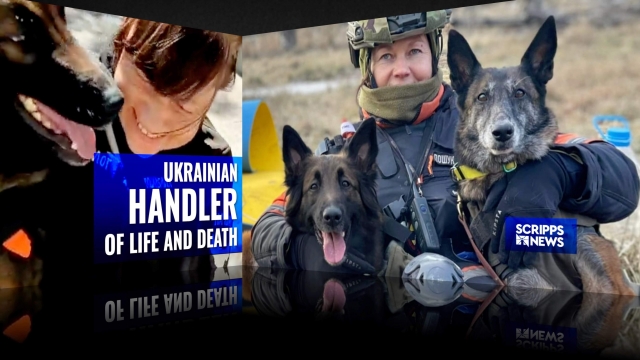In the smoldering ruins of another remorseless Russian attack on an apartment building, Larysa Borysenko and her Belgian shepherd, Besha, are on a mission to search for the victims who did not survive.
“We do it completely with our own hands,” Borysenko told Scripps News.
Emergency workers bring her teams of dogs and their handlers to ground zero. The dogs know the drill all too well and can find the body, dig or lie down next to it, then stay.
“There are torn bodies, there are baked bodies, completely baked bodies, which our dogs find bit by bit,” said Borysenko.
When she goes home after a hard day’s work, she can’t just stop thinking about it.
“We try to turn off our emotions completely when we work. But a normal person can't help but internalize some moments,” said Borysenko. “When we come in and see the person just came home from a shift at work, we just imagine that the person was sitting and watching TV, and then this happened.”
Borysenko’s band of dogs and handlers is called “Antares” in memory of their founding K-9 member.
“That was our first rescue dog,” said Borysenko.
Over the past two years, the group of mostly women, all volunteers, and their dogs have located around 400 victims of Russian attacks. The search teams provide dignity to the deceased and closure to the loved ones who survive them.
The dogs include Dobermanns, German and Belgian shepherds, and Labradors.
The dog rescue teams’ heroics have earned them plaudits from around the world, with children sending them drawings to honor the animals that perform the dangerous work of recovering loved ones from the ruins of war.
“They have to be buried. Their relatives have to go through certain rituals to accept, to grieve, and to move on somehow,” said Borysenko.
The army also partners with the Antares teams to recover fallen soldiers in forests, even amidst unrelenting Russian shelling.
It was on one such mission that Borysenko almost lost her life. Scripps News was making plans to visit Borysenko last winter when suddenly she went silent. We later found that she was in a coma.
Borysenko had been with 5-year-old Besha on a mission to search for bodies of Ukrainian soldiers in an area liberated from the Russians.
“The dog went ahead of me down into a trench, and at that moment I heard a crack to my left, and then I remembered that I was lying down. There was a very terrible taste of blood,” said Borysenko, noting these were the last things she remembered before she was injured.
Borysenko says she tripped a Russian booby trap fixed with a grenade that was "on the ground and covered with leaves."
The blast riddled her legs with molten metal.
“I was screaming, "Where is my Besha? Where is my Besha?" said Borysenko.
She lost consciousness before getting the answer and finally waking up in intensive care three days later.
“The first thing I asked was, 'What happened to my dog?' because I realized that she had to have died, and the second thing I asked was, 'Do I still have my legs?' And when I was told that the dog was alive, I couldn't believe it. And I still had my legs. I was euphoric,” said Borysenko.
But there would be dark days ahead. The Russian booby trap left her with almost more physical pain than she could bear.
“There were thoughts of suicide,” said Borysenko. “I didn't want to communicate with anyone — no one at all.”
When Borysenko was in the depths of her despair, the commander who had been with her on that near-fatal mission appeared by her hospital bed, demanding to wheel her outside.
“A man was waiting for me in the bushes with Besha,” said Borysenko.
Once they were reunited, Besha would remain by Borysenko's side through the grueling months ahead as she gained the strength to walk again. Just six months after her near-fatal injury, she and Besha got back to work.
"I am fighting my fears that I have now in the forest," said Borysenko.
The 52-year-old, whose fortitude inspires volunteers, most of them decades younger, found her passion before the war.
“I have a first degree in nursing and a second one in psychology,” said Borysenko.
Tapping into the minds of dogs became her passion. She developed her own training method and founded a wilderness search and rescue organization, never anticipating how someday they would be called to duty.
She and Besha are needed now more than ever as Russian missile attacks escalate and Ukraine’s air defense systems run short on ammunition.
“Everyone has to do what they can do on their own front lines,” said Borysenko.
For Borysenko, that means facing her fears and staying in the fight.
Trending stories at Scrippsnews.com



